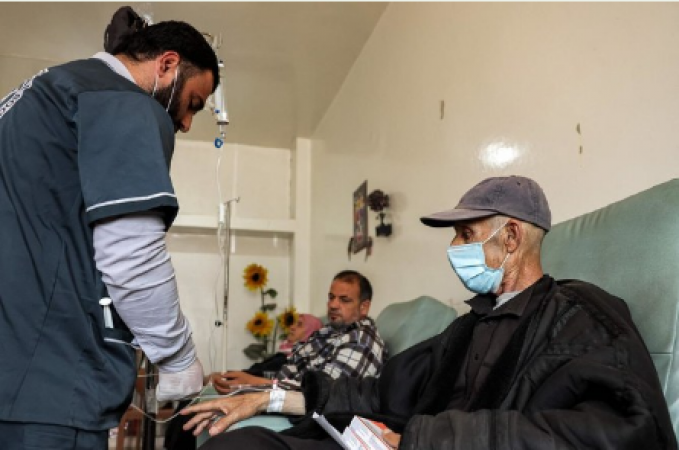
Halzoun: Umm Khaled, who is huddled inside a tent in rebel-held northwest Syria, claims she is afraid her unborn child will perish unless she receives specialised care for a congenital heart defect in close-by Turkiye.
extremely ill Syria's last rebel stronghold, Idlib, used to have access to life-saving medical care on the other side of the border.
However, after a deadly earthquake struck southern Turkiye on February 6, the main crossing there for medical visits was abruptly closed, forcing Ankara to put its domestic needs first.
Baby Islam, who was only a week old when the disaster struck, requires immediate cardiac surgery, which is not available in Syria's war-torn Idlib region, where the health care system further degraded after the earthquake.
Also Read: Chinese naval vessel on 'friendly' tour to the Philippines
Umm Khaled spoke, exposing only her eyes and hands from beneath a black niqab. "I watch my daughter suffer and I can't do anything about it," she said.
The 27-year-old claimed that as her baby's condition deteriorated, she began to lose weight.
Islam experiences frequent breathing difficulties, and a doctor has warned that if untreated, repeated episodes like these, which put additional strain on her heart, could be fatal.
However, only cancer patients have been permitted to enter Turkiye since Monday, after months of waiting.
Umm Khaled spoke as her three other young children sat on the ground in their tent in the village of Halzoun. "When she cries, she turns blue and her heart beats very fast," Umm Khaled said.
Islam, the infant in her lap, was wriggling as she spoke, "I hope they'll open the crossing soon."
Also Read: "The UN Security Council must give Arab and global crises more attention than just Ukraine"
Most heart and cancer patients in Idlib are referred to Turkiye by doctors, where they can receive free care thanks to a deal between the region's government and Ankara.
Additionally, people requiring complex surgery, premature babies, and burn victims were permitted to pass.
However, after the earthquake destroyed medical facilities on the Turkish side of the border, Ankara stopped allowing patients from Idlib to access care through the Bab Al-Hawa crossing.
Humanitarian aid from the United Nations, goods, and even Syrians visiting family in the region have all been allowed through the border. In Turkiye, where he typically receives medication and treatment every three months, Firas Al-Ali underwent surgery and tests after being identified as having a benign tumour close to his brain in 2017.
On February 23, while he was awaiting treatment, an earthquake occurred. I'm experiencing pain in my eyes and head as a result of the delay, the 35-year-old blacksmith said.
"My treatment is unavailable here, and if it is, it's expensive, and I can't afford it." Three million people live in Idlib, which is controlled by rebels; many of them are refugees from other parts of Syria and are in need of aid.
Civilians from Idlib are not permitted in the government-held regions of Syria. Hayat Tahrir Al-Sham, a former Al-Qaeda affiliate in the nation, is in charge of the Syrian side of the Bab Al-Hawa border crossing into Turkiye.
The only cancer treatment facility in Idlib is run by the Syrian American Medical Society.
The clinic was understaffed and overrun with "many patients who urgently need to be admitted in Turkiye," according to paediatric oncologist Abdel Razzaq Bakur.
According to him, the children's ward has taken in 30 patients who were previously untreated due to the border closure. Additional 40 "haven't been receiving chemotherapy and their condition is very bad; some risk dying," according to the report.
He added that some families had attempted to import medicine from Lebanon or Turkey, but the costs were frequently too high.
He questioned, "How are they supposed to secure chemotherapy doses when most people can't even afford their basic daily needs?"
Yusuf Hajj Yusuf, 60, said a recent scan revealed his lung cancer had worsened. He was due to undergo chemotherapy in Turkiye the day the earthquake struck.
He had begged family members to contribute to the cost of his care in Idlib but "no longer had the strength" to raise money.